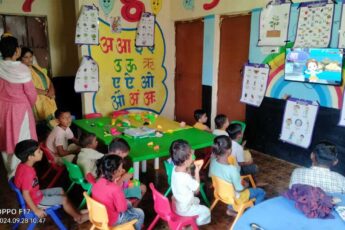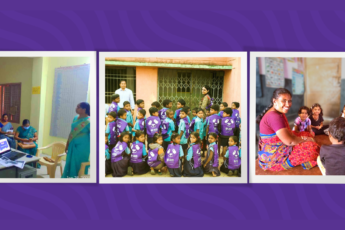The COVID-19 Effect: Learning Loss In Early Childhood And How To Mitigate It
The ‘learning loss’ is real.
Multiple early education experts have sounded the alarm, saying the gap in learning caused due to school closures can impact an entire generation of children. In India, around 320 million students have been affected by COVID-19 school closures, and the numbers show no signs of abating. This situation is compounded by the fact that India had already noticed signs of learning poverty among our children. The ASER 2019 report shows only 16.2% of children could read Std I text while in Std I, and this number improved to 50.8% of children in Std III. This puts children’s ability to read at least two years behind where the current curriculum expects them to be at their age.
Why A Learning Loss In The Early Years Is Especially Worrying
Cognitive psychology suggests that without practice, children are most susceptible to forgetting facts and procedural skills (Cooper & Sweller, 1987). A WHO research paper shows a poor start in life can lead to poor health, nutrition, and inadequate learning, resulting in low adult earnings as well as social tensions. Because of this shaky start, affected people are estimated to lose about a quarter of their average yearly income, while their country may lose up to twice their current GDP expenditure on health and education. These consequences impact not only present, but also future generations.
Types Of Learning Loss
According to the CEO of Azim Premji Foundation, Anurag Behar, learning loss is of two kinds:
a) What children should have learnt during the period when schools were closed (e.g., in 2020-2021).
b) What children have already forgotten from their previous year (e.g., until March 2020) of learning, which we can term ‘academic regression.’ This phase is similar to children’s experience during the summer vacations when they forget parts of the previous year’s learning.
Experts warn that these effects will only compound over time. For early learners who are missing out on learning during the most crucial period — 85% of the brain’s development happens in the early years before the age of eight — this loss will negatively impact their future.
How Edtech Helped During This Crisis
India has always been invested in early childhood education; we are the proud flag bearers of one of the most extensive ECCE programs in the world – the Integrated Child Development Scheme (ICDS). We have taken further measures to increase the focus on early education with our National Education Policy (NEP) 2020.
As a nation, we recognised the need for urgent intervention and have taken (and continue to take) steps towards mitigating learning loss. Educational initiatives by several nonprofits, learning institutions, and edtech organisations followed announcements of public-private partnerships by various state governments.
Teachers’ Ability To Use Technology Rose: The mayhem caused by school closures led to a nationwide crisis. However, educators across India rose to the challenge, valiantly fighting to deliver education to their students. Since in-person learning was not a possibility, educators used innovative modes of delivery, like loudspeakers, WhatsApp, and more. (Read their efforts, in The Inspiring Educators Innovating Teaching-Learning During This Health Crisis) While striving to figure out a way to teach despite school closures, multiple educators have reported a rise in their technology-based knowledge and ability.
Opinion About Using Technology In Education Has Changed: The scale tipped towards a more positive outlook, say educational experts. A significant portion of this change came from the outreach and support given to traditional learning by multiple edtech organisations and the Government itself. The Centre emphasised digital techniques and tools to help teachers navigate teaching and learning during this crisis. The increased usage of technology has given educators a better understanding of how to leverage online learning for better outcomes in their classrooms and learning centres.
Online Instruction Took Hold: With little to no contact between children and their teachers, online instruction was one of the few ways educators approached the crisis. Fueled (at least in part) by increased access to digital devices, online learning emerged as a strong alternative to traditional learning. To withstand tech-equity issues, problems of internet access, and the dizzying array of approaches to online instruction across states and schools, governments partnered with the private sector, boosting access to educational technology programs and digital learning.
Our world as we know it has changed, and how we impart learning to children has to change accordingly. The pandemic has highlighted multiple areas of improvement in the early learning landscape in India. How we bridge the learning gap will decide our children’s future and the future of India.
What have been your young learners’ experiences with learning loss during the pandemic? Comment below.
Stay updated and follow us:
Facebook – https://www.facebook.com/SquarepandaSquarePandaIndia/
Twitter – https://twitter.com/squarepanda_edu
LinkedIn – https://www.linkedin.com/company/square-panda-in
Instagram – https://instagram.com/squarepanda.india
YouTube – https://youtube.com/channel/UCaN_P-_l30Rd0FmsGrhQLrQ




Leave a Comment